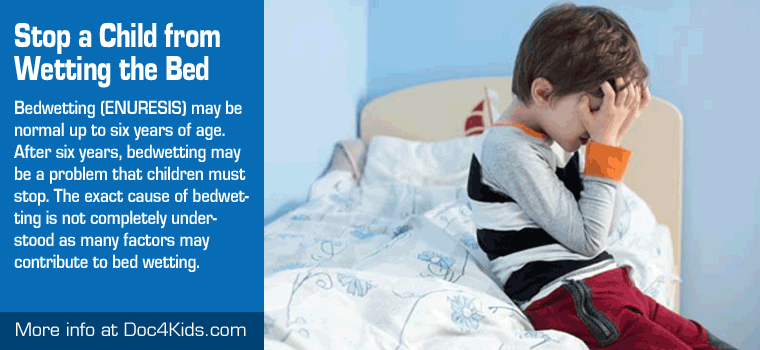Understanding Bed Wetting and How to Stop a Child from Wetting the Bed
Bedwetting (ENURESIS) may be normal up to six years of age. After six years, bedwetting may be a problem that children must stop. The exact cause of bedwetting is not completely understood as many factors may contribute to bedwetting. Some factors include the following:
1) There may be an inherent tendency toward bedwetting in some children since bedwetting often runs in families with boys affected more than girls.
2) For a child to void properly, there must be conscious control of nervous impulses to the brain to sense fullness. The child then needs to coordinate all sphincters and motor muscles needed to void in a coordinated way. This sequence may be delayed in some children.
3) Some children have a small bladder capacity and may not hold much urine. The bladder may be normal size but when it is empty it may contain a small amount of residual urine.
4) A child who wets in bed may not receive a strong enough message to the brain from the bladder that the bladder is full and needs to be evacuated. The need to urinate; therefore, does not wake the child up from a deep sleep.
5) Occasionally, bedwetting may be caused by a medical problem such as a urinary tract infection or diabetes. We will check for these in the office to make sure that there is not an underlying medical problem.
6) Emotional situations such as stress in the family from such things as a death, divorce, or birth of a new sibling or move to a new house may cause temporary bedwetting. It usually stops after an adjustment period. Emotionally disturbed children can be bedwetters, but it is more likely that bedwetting is itself is emotionally upsetting the child.
You may help us in determining what the problem is with bedwetting if you will do the following: Measure the child’s bladder capacity. To do this, get a measuring cup and a quart plastic milk bottle. Pour 1 oz of water from the cup into the milk bottle and mark the milk bottle at 1 oz. Pour another oz of water from the cup into the milk bottle and mark the milk bottle-now at 2 oz. Continue to do this for approximately 15 oz. Now, tell the child to hold their urine until they feel they can’t hold anymore. Then get them to void into the plastic milk bottle. The child should be able to hold the following: AGE + 2 yrs. (For instance, if you have a 6 yr. old child, she should hold 8 oz of urine when she voids after being “maximally full”.
How To Stop a Child From Wetting The Bed? or How Do I Stop My Child From Wetting the Bed?
1) Do not punish the child. Punishment does not help and it may make the child bedwet more due to stress.
2) Decrease the amount the child drinks in the evening especially caffeinated drinks like coca-colas or iced tea. Caffeine increases the amount that the child urinates.
3) If your child has an “accident”, make the child responsible for helping to change the wet sheets and pajamas and help put dirty laundry in the appropriate place. This puts responsibility onto the child. Do not make the child feel guilty about wetting the bed, but calmly tell the child that he/she needs to strip the bed of the wet sheets, put them in the washing machine and then make their own bed. This is a consequence–not a punishment.
4) Reward the dry nights. Rewards can vary from verbal praise to stickers to toys. It is usually a good idea to put a gold sticker on a calendar for each dry night and then give a prize for every dry night so that the child not only gets praised but also gets a reward. If the child gets three to five stickers, then he can get a small prize.
5) Daytime bladder training may help if the child has a small capacity bladder as mentioned above. Allow the child to drink a lot during the day and hold their urine as long as possible before going to the bathroom and then ask the child to start and stop the urine stream as they are voiding. This will help tighten up the bladder sphincter.
6) Waking the child up to go to the bathroom may prevent changing the sheets if the child only wets the bed once each night at a particular time. The practice of waking the child up to go to the bathroom does not really help the child stop bedwetting. If anything, it tends to sensitize the parents to bedwetting–not the child.
7) Medication is a last resort for older children and there are medications that can be used in the nose or orally. There are also “enuresis alarms” that may be used to detect moisture. The Doctor will discuss these options with you.
8) Close follow-up with your child and us is very important. We will need to evaluate your child within a couple of weeks after starting one of the therapies to see how your child is doing. Though bedwetting is inconvenient for parents, you need to treat this with patience and understanding. Most times, children truly want to stop, but they need some help to stop. Please ask us any questions that you may have about bedwetting because this needs to be a team approach with the parent, child, and the pediatrician.

